Watching the watchdogs
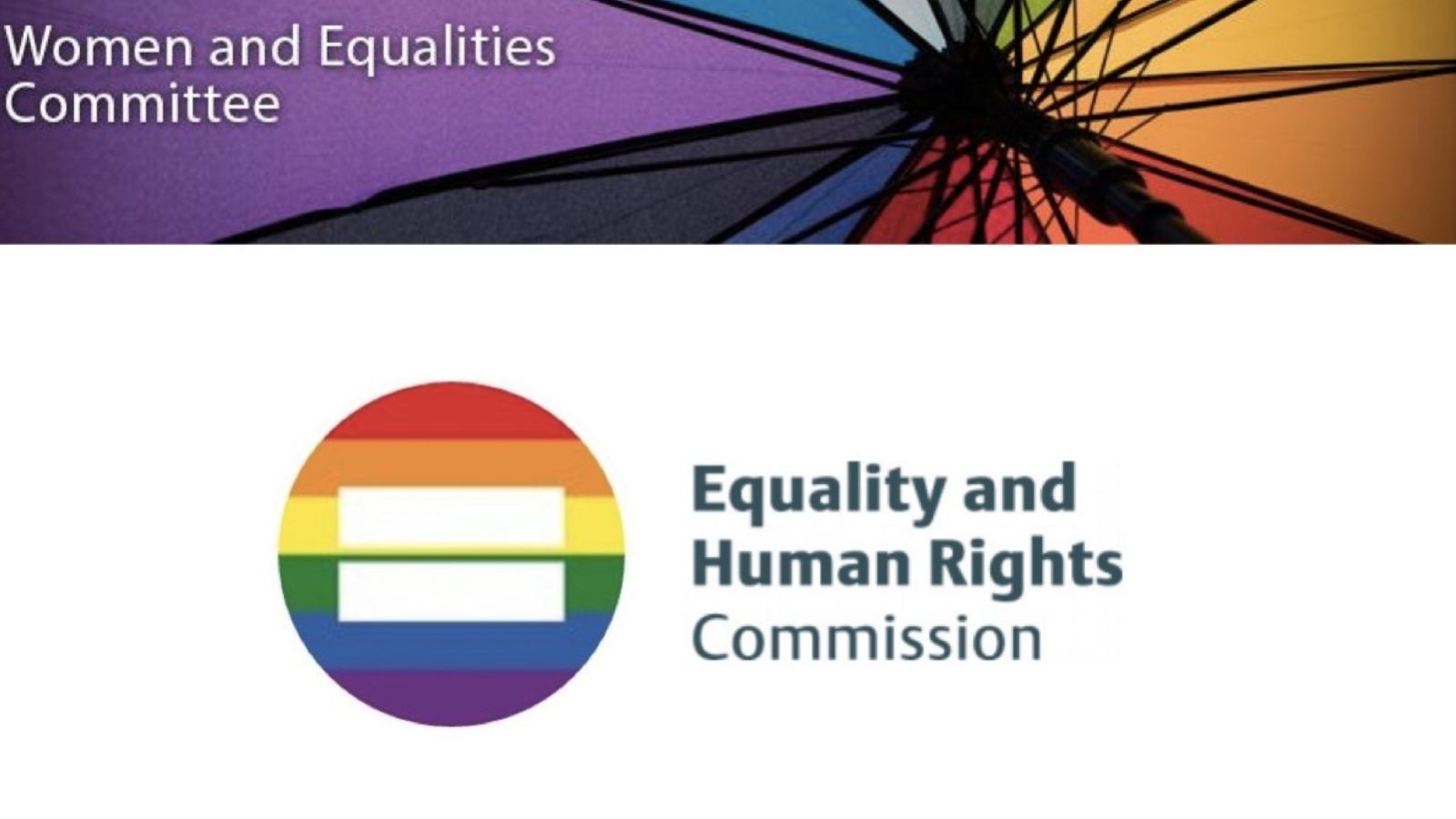
The job of the Women and Equalities Select Committee (WESC) is to hold Government to account on equality law and policy, particularly the Equality Act 2010. It also scrutinises the equalities watchdog, the Equality and Human Rights Commission.
The Committee has received over 2,000 submissions in its current inquiry on reform of the Gender Recognition Act. This is an extraordinary number, with very few coming from government bodies or even large charities, and very many from small volunteer led organisations and women working in their own time to explain the conflict over single sex services, as well as transgender individuals. We have catalogued some of the responses here. You can read Sex Matters’ submission here.
We are not optimistic that the Committee is willing to take the gender critical inputs seriously. Chair Caroline Nokes is sticking with “be kind”:
“When we’ve become so much more tolerant about so many aspects of life, it just seems to be really, really awful that we can’t be more understanding, and everybody the whole time wants to drag it back to sort of the lowest common denominator and to wheel out, you know, the one example they can find of a trans woman who’s attacked someone. Please, you know, we can be kinder than that. We can be nicer than that.”
Caroline Nokes
Nevertheless the Inquiry is an opportunity to put evidence and issues on the the public record. The next oral evidence session will be with gender critical organisations.
Last week Sex Matters launched a project to crowdsource an analysis of all the written submissions. This will shine more sunlight on the evidence and opinion in the submissions, and which ones the WESC pays attention to.
The dog that didn’t bark
While the analysis of who responded to the call for evidence will be interesting, it is also worth noting who did not.
On 27 November 2020 (the day of the deadline for responses) Rebecca Hilsenrath, recently resigned Chief Executive of the Equality and Human Rights Commission (budget: £18m, 200 staff) wrote to the Committee to say they were unable to provide a submission.
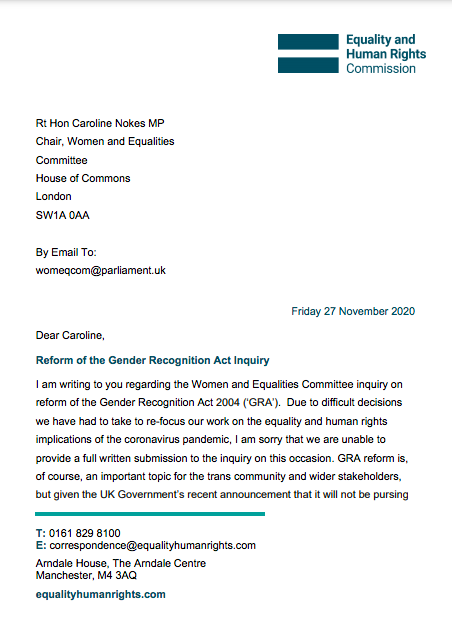
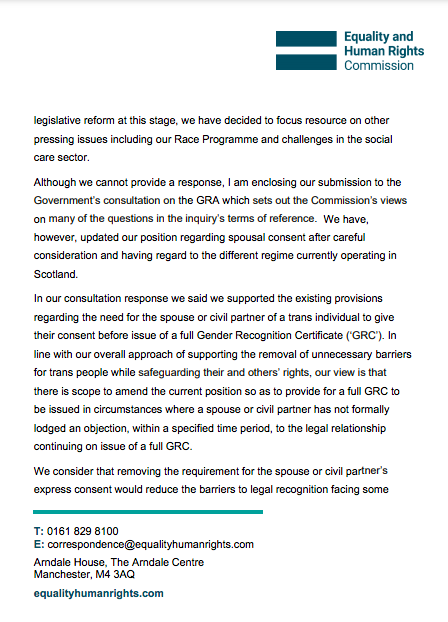
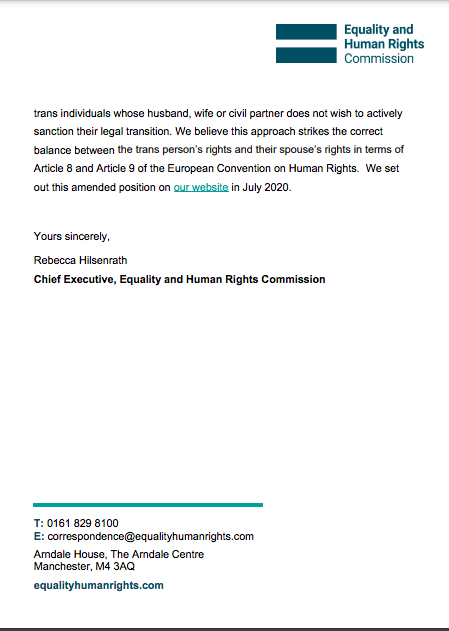
Instead they sent their old 2018 response to the government’s GRA consultation.
In 2018 they had at least considered one of the risks of self ID, and called for research:
our engagement with stakeholders has revealed accounts of the lengths to which some people will go to gain access to single-sex spaces such as domestic violence refuges. We consider that further research and ongoing monitoring is required to determine (i) the extent of the risk that opportunists may use or are using trans identities (with or without a GRC) to perpetrate offences, and (ii) whether enabling GRCs to be granted on the basis self-identification may lead to the GRC process being misused to this end. Such research and ongoing monitoring could be used to help ensure the legal framework, including policies and guidance on its application, provides adequate safeguards as required by ECHR Articles 2, 3 and 8.
EHRC, 2018.
Caroline Nokes wrote back to say that the Committee was disappointed, particularly given the EHRC’s mandate to enforce equality legislation on all the protected characteristics. She said the EHRC could still submit written evidence and would be invited to provide oral evidence.
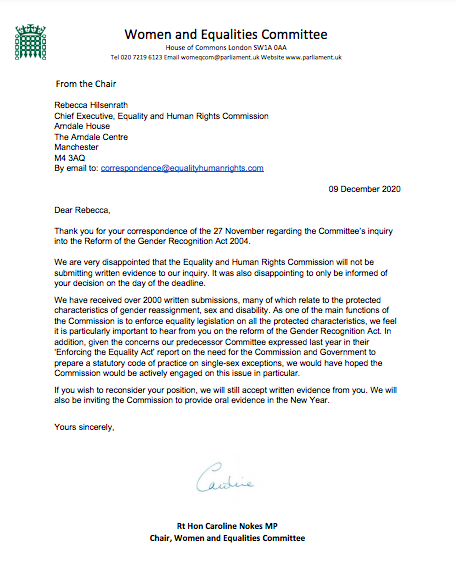
Melanie Field for the EHRC responded saying that the EHRC would not be using its “limited resources” to respond to the Committee but instead would be undertaking a litigation strategy to assist the courts in clarifying the law.
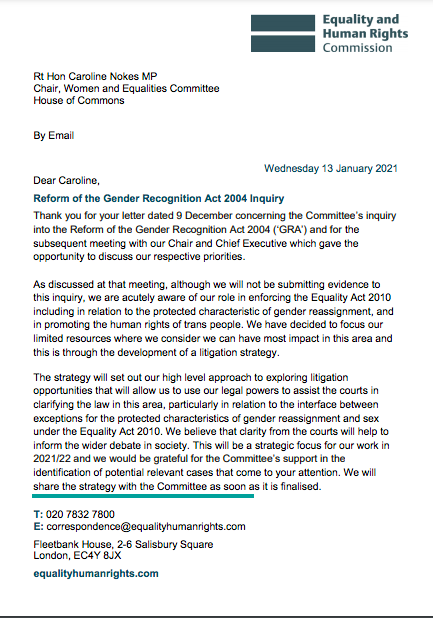
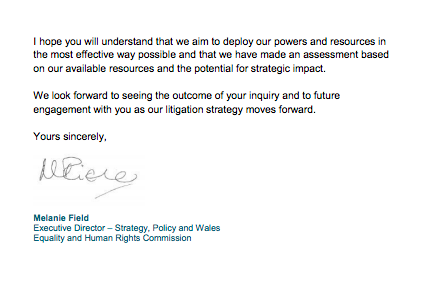
This is an extraordinary situation
The provision of single sex services comes under the Equality Act. The EHRC is responsible for promoting enforcement of the Act and protecting everybody’s rights.
Some organisations say the law gives any man who identifies as a women (or perhaps as non-binary) the right to access shared services provided for women.
Others say women and girls should be allowed to wash, change, go to the toilet, stay in a hospital ward, recover from rape and domestic abuse in female-only spaces, with clear rules.
The EHRC says it just doesn’t know and has nothing at all to say to the Women and Equality Select Committee on the topic.
Rebecca Hilsenrath said last year.
“We need clear conversations and proper debate about what the law and policy actually mean in practice, and what would be the practical effect of any changes – dialogue must be constructive, tolerant and based on the facts. This includes challenging prejudices, calling out abusive behaviour and being open about the rights and needs of everyone involved. ”
But she took no leadership to make that happen, leaving it to groups of unpaid women to convene events, do research and make the rational arguments that are needed, risking their safety, reputations and livelihoods in the process, because this activity has been deemed “unworthy of respect in a democratic society”.
If the atmosphere in this debate is toxic it is because the organisations whose mandate it is to bring clarity and calm have refused to do their job.
This isn’t the first time the EHRC has said “sorry, I’m washing my hair” to the Women and Equalities Select Committee on questions of women’s rights and safety.
As Nokes highlighted the previous Inquiry into “Enforcing the Equality Act” recommended that the Commission and Government prepare a statutory code of practice on the single-sex exceptions. The EHRC said no. It said it was working on guidance for service providers. We have seen nothing.
It responded to another Inquiry by the Women and Equality Select Committee on “Making Public Places Safe for Women and Girls”, saying it would not be doing anything direct to address sexual harassment of women and girls in public places.
Why is it that the EHRC is so reluctant to state what it understands the law to provide in terms of single sex spaces for the safety and dignity of women and girls?
Could it be to do with its allegiance with Stonewall?
EHRC is a Stonewall Champion, and the close and friendly relationship was revealed by a recent #dontsubmittostonewall Freedom of Information request. In June 2019 they met to discuss “guidance you [EHRC] are involved in”. The staff member from Stonewall said:
Although we disagree in some areas on interpretation of the law, obviously it is important for trans communities we work together to build common ground and consensus and we want to take an active role in making that happen, very much in line with the build-up strategy we talked about.
Stonewall to EHRC June 2019

This ‘consensus building’ seems to have worked for Stonewall. EHRC has shied away from producing its promised guidance for schools and for service providers, which, if it had been consistent with the Equality Act would have contradicted Stonewall’s advice.
In March 2020, in their response to the Scottish Government on GRA reform, EHRC dropped all mention of the need for research and caution it had pointed to in 2018.
In August 2020 EHRC was promoting Stonewall’s view that access to single sex services should be by gender identity.
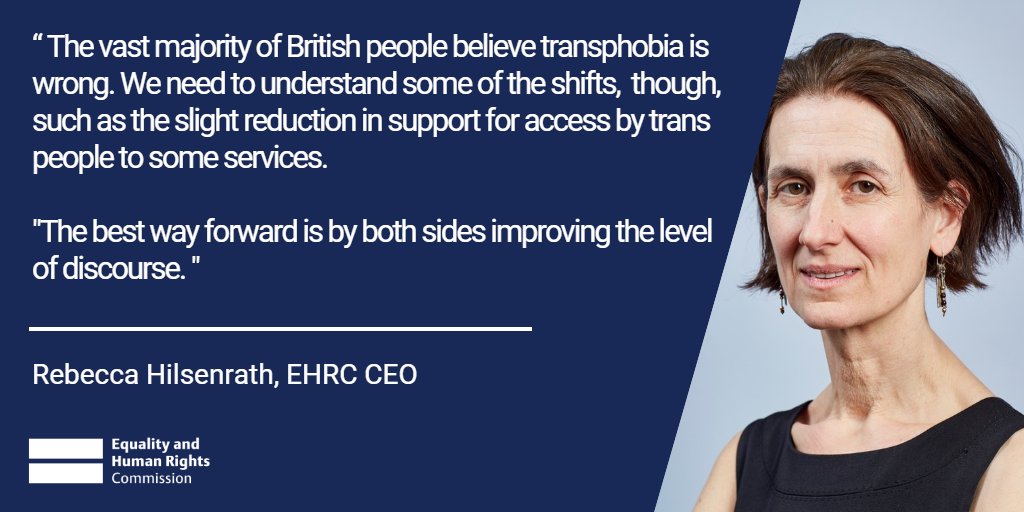
In September 2020 EHRC appear to be discussion with Stonewall about a “new inclusive kitemark”.
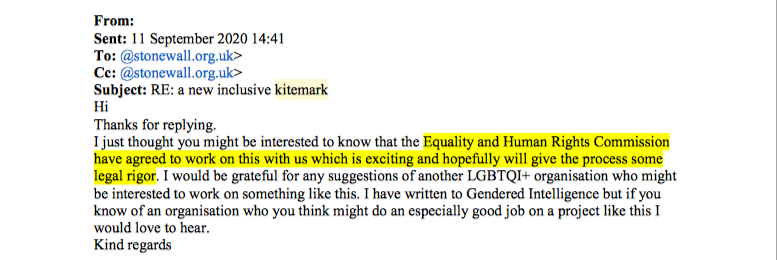
In November 2020 they were comparing notes about the WESC Inquiry
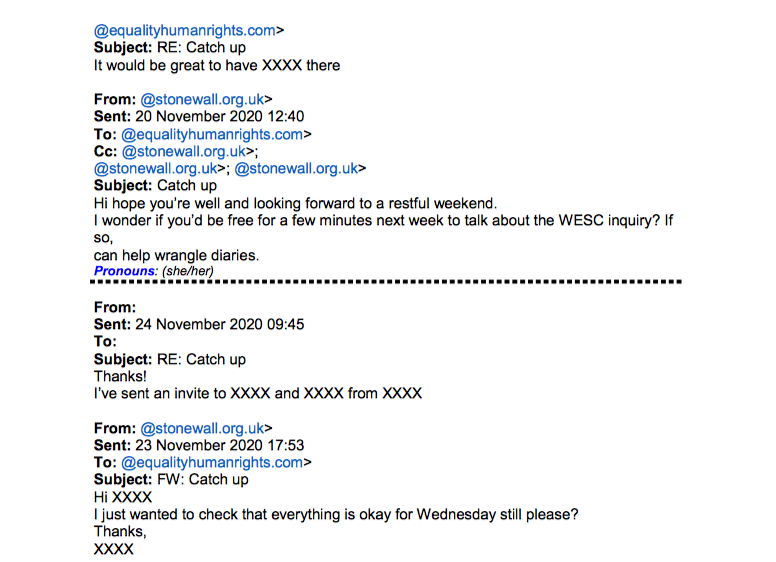
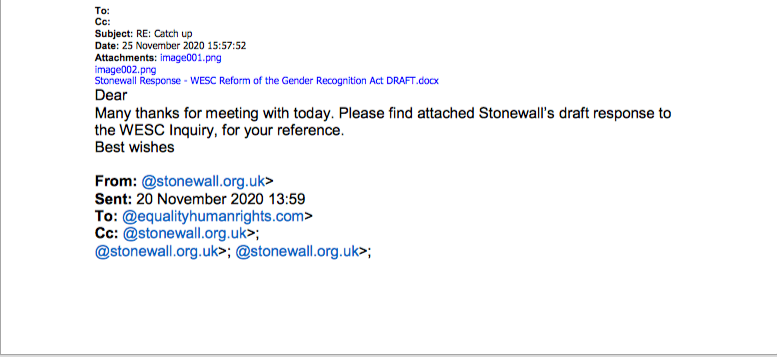
And by November 27th the EHRC told the Women and Equalities Select Committee that it has nothing to say on single sex services.
Could it be that the reason that EHRC could not respond to the call for evidence is because they would have to admit that the law does not support Stonewall’s interpretation of it?
Have they prioritised their allegiance to Stonewall law over their responsiblity to uphold the Equality Act?
This is the question the Women and Equality Select Committee should ask when they call EHRC to give oral evidence.
